- Home
- Karen Marie Moning
Darkfever_The Fever Series Page 2
Darkfever_The Fever Series Read online
Page 2
I said, “I’m going and I don’t care if you like it or not.”
Mom burst into tears. She slapped the dough she’d been kneading down on the counter and ran out of the room. After a moment, I heard the bedroom door slam down the hall.
That’s one thing I can’t handle—my mom’s tears. As if she hadn’t been crying enough lately, I’d just made her cry again. I slunk from the kitchen and crept upstairs, feeling like the absolute lowest of the lowest scum on the face of the earth.
I got out of my pajamas, showered, dried my hair and dressed, then stood at a complete loss for a while, staring blankly down the hall at Alina’s closed bedroom door.
How many thousands of times had we called back and forth during the day, whispered back and forth during the night, woken each other up for comfort when we’d had bad dreams?
I was on my own with bad dreams now.
Get a grip, Mac. I shook myself and decided to head up to campus. If I stayed home, the black hole might get me, too. Even now I could feel its event horizon expanding exponentially.
On the drive uptown, I recalled that I’d dropped my cell phone in the pool—God, had it really been all those weeks ago?—and decided I’d better stop at the mall to get a new one in case my parents needed to reach me while I was out.
If they even noticed I was gone.
I stopped at the store, bought the cheapest Nokia they had, got the old one deactivated, and powered up the replacement.
I had fourteen new messages, which was probably a record for me. I’m hardly a social butterfly. I’m not one of those plugged-in people who are always hooked up to the latest greatest find-me service. The idea of being found so easily creeps me out a little. I don’t have a camera phone or text-messaging capability. I don’t have Internet service or satellite radio, just your basic account, thank you. The only other gadget I need is my trusty iPod—music is my great escape.
I got back in my car, turned on the engine so the air conditioner could do battle with July’s relentless heat, and began listening to my messages. Most of them were weeks old, from friends at school or The Brickyard who I’d talked to since the funeral.
I guess, somewhere in the back of my mind, I’d made the connection that I’d lost cell service a few days before Alina had died and was hoping I might have a message from her. Hoping she might have called, sounding happy before she died. Hoping she might have said something that would make me forget my grief, if only for a short while. I was desperate to hear her voice just one more time.
When I did, I almost dropped the phone. Her voice burst from the tiny speaker, sounding frantic, terrified.
“Mac! Oh God, Mac, where are you? I need to talk to you! It rolled straight into your voice mail! What are you doing with your cell phone turned off? You’ve got to call me the minute you get this! I mean, the very instant!”
Despite the oppressive summer heat, I was suddenly icy, my skin clammy.
“Oh, Mac, everything has gone so wrong! I thought I knew what I was doing. I thought he was helping me, but—God, I can’t believe I was so stupid! I thought I was in love with him and he’s one of them, Mac! He’s one of them!”
I blinked uncomprehendingly. One of who? For that matter, who was this “he” that was one of “them” in the first place? Alina—in love? No way! Alina and I told each other everything. Aside from a few guys she’d dated casually her first months in Dublin, she’d not mentioned any other guy in her life. And certainly not one she was in love with!
Her voice caught on a sob. My hand tightened to a death grip on the phone, as if maybe I could hold on to my sister through it. Keep this Alina alive and safe from harm. I got a few seconds of static, then, when she spoke again she’d lowered her voice, as if fearful of being overheard.
“We’ve got to talk, Mac! There’s so much you don’t know. My God, you don’t even know what you are! There are so many things I should have told you, but I thought I could keep you out of it until things were safer for us. I’m going to try to make it home”—she broke off and laughed bitterly, a caustic sound totally unlike Alina—“but I don’t think he’ll let me out of the country. I’ll call you as soon—” More static. A gasp. “Oh, Mac, he’s coming!” Her voice dropped to an urgent whisper. “Listen to me! We’ve got to find the”—her next word sounded garbled or foreign, something like shi-sadu, I thought. “Everything depends on it. We can’t let them have it! We’ve got to get to it first! He’s been lying to me all along. I know what it is now and I know where—”
Dead air.
The call had been terminated.
I sat stunned, trying to make sense of what I’d just heard. I thought I must have a split personality and there were two Macs: one that had a clue about what was going on in the world around her, and one that could barely track reality well enough to get dressed in the morning and put her shoes on the right feet. Mac-that-had-a-clue must have died when Alina did, because this Mac obviously didn’t know the first thing about her sister.
She’d been in love and never mentioned it to me! Not once. And now it seemed that was the least of the things she’d not told me. I was flabbergasted. I was betrayed. There was a whole huge part of my sister’s life that she’d been withholding from me for months.
What kind of danger had she been in? What had she been trying to keep me out of? Until what was safer for us? What did we have to find? Had it been the man she’d thought she was in love with that had killed her? Why—oh why—hadn’t she told me his name?
I checked the date and time on the call—the afternoon after I’d dropped my cell phone in the pool. I felt sick to my stomach. She’d needed me and I hadn’t been there for her. At the moment Alina had been so frantically trying to reach me, I’d been sunning lazily in the backyard, listening to my top one hundred mindless happy songs, my cell phone lying short-circuited and forgotten on the dining-room table.
I carefully pressed the save key, then listened to the rest of the messages, hoping she might have called back, but there was nothing else. According to the police, she’d died approximately four hours after she’d tried reaching me, although they hadn’t found her body in an alley for nearly two days.
That was a visual I always worked real hard to block.
I closed my eyes and tried not to dwell on the thought that I’d missed my last chance to talk to her, tried not to think that maybe I could have done something to save her if only I’d answered. Those thoughts could make me crazy.
I replayed the message again. What was a shi-sadu? And what was the deal with her cryptic You don’t even know what you are? What could Alina possibly have meant by that?
By my third run-through, I knew the message by heart.
I also knew that there was no way I could play it for Mom and Dad. Not only would it drive them further off the deep end (if there was a deeper end than the one they were currently off), but they’d probably lock me in my room and throw away the key. I couldn’t see them taking any chances with their remaining child.
But … if I went to Dublin and played it for the police, they’d have to reopen her case, wouldn’t they? This was a bona fide lead. If Alina had been in love with someone, she would have been seen with him at some point, somewhere. At school, at her apartment, at work, somewhere. Somebody would know who he was.
And if the mystery man wasn’t her killer, surely he was the key to discovering who was. After all, he was “one of them.”
I frowned.
Whoever or whatever “they” were.
TWO
I quickly learned that it was one thing to think about going to Dublin and demanding justice for my sister—and entirely another to find myself standing there in the jet-lagged flesh, across an ocean, four thousand miles from home.
But standing there I was, in rapidly deepening dusk, on a cobbled street in the heart of a foreign city, watching my taxi drive away, surrounded by people speaking a version of English that was virtually unintelligible, trying to come to terms with
the fact that, although there were more than a million inhabitants in and around the city, I didn’t know a single soul.
Not in Dublin, not in Ireland, not on the entire continent.
I was as alone as alone could be.
I’d had a major blowout fight with Mom and Dad before I’d left, and they weren’t speaking to me. Then again, they weren’t speaking to each other, either, so I was trying not to take it too personally. I’d quit my job and withdrawn from school. I’d drained my checking and savings accounts. I was a twenty-two-year-old single white female alone in a strange country where my sister had been killed.
Gripping a suitcase in each hand, I spun in a circle on the sidewalk. What in God’s name did I think I was doing? Before I could entertain that thought long enough to go tearing off in a panic-stricken dash after my departing cab, I squared my shoulders, turned, and marched into The Clarin House.
I’d chosen this bed-and-breakfast for two reasons: It was close to where Alina had kept a small, noisy apartment over one of the many Dublin pubs, and it was one of the least expensive in the area. I had no idea how long I would be staying, so I’d booked the cheapest one-way flight I’d been able to find. I had limited funds and needed to watch every penny, or I could end up stuck abroad without enough money to make it home. Only when I was convinced the police—or An Garda Síochána, the Guardians of the Peace, as they were called over here—were doing the best job possible would I begin to even consider leaving Ireland again.
On the trip over, I’d devoured two slightly outdated guidebooks I’d found the day before at The Book Nook, Ashford’s only used-book store. I’d pored over maps, trying to bone up on Ireland’s history and acquaint myself with local customs. I’d passed a three-hour layover in Boston with my eyes closed, trying to recall every detail about Dublin I’d ever picked up from Alina in our phone calls and e-mails. I was afraid I was still as green as an unripe Georgia peach, but hopefully I wouldn’t be the gauche tourist, stepping on toes every time I turned around.
I entered the foyer of The Clarin House and hurried to the counter.
“Evenin’ t’ye, m’dear,” the desk clerk said cheerfully. “ ’Opin you ’ave reserves, a’sure ye’ll be needin’ ’em such a foine night th’ season.”
I blinked and replayed what he had just said in my mind, much more slowly. “Reservations,” I said. “Oh yes.” I handed my e-mail confirmation to the elderly gentleman. With his snowy hair, neatly trimmed beard, sparkling eyes behind round, rimless glasses, and oddly small ears, he actually looked like a merry leprechaun from the fabled Land o’ Green. While he confirmed my stay and checked me in, he thrust flyers at me and prattled nonstop about where to go and what to see.
At least I think he did.
Truth was, I understood little of what he was saying. Though his accent was charming, the suspicion I’d formed at the airport had just been confirmed: It was going to take my sadly monolingual American brain time to acclimate to the Irish inflection and unique way of phrasing things. As rapidly as the clerk was speaking, he might as well have been havering away (one of my new phrases from my trusty guidebook) in Gaelic for all the sense it made to me.
A few minutes later, and none the wiser about a thing he’d recommended, I was on the third floor, unlocking the door to my room. As I’d expected for the price, it wasn’t much. Cramped, only seven or eight feet in either direction, the room was plainly furnished with a twin bed perched beneath a tall narrow window, a small three-drawer dresser topped by a lamp with a stained yellow shade, a rickety chair, a pedestal sink for washing up, and a closet about as wide as I was with—I pushed it open—a whopping two wire hangers, badly bent. The bathroom was a shared deal down at the end of the hall. The only concession to atmosphere was a faded orange-and-pink rug and a matching drape over the window.
I dropped my bags on the bed, pushed the curtain aside, and looked out at the city where my sister died.
I didn’t want it to be beautiful, but it was.
Full dark had fallen and Dublin was brilliantly lit. There’d been a recent rain, and against the coal of night, the shiny cobbled streets gleamed amber, rose, and neon-blue from reflected lamps and signs. The architecture was a kind I’d seen before only in books and movies: Old World, elegant, and grand. The buildings boasted ornate facades, some adorned by pillars and columns, others sported handsomely detailed woodwork and tall, majestic windows. The Clarin House stood on the outskirts of the Temple Bar District, which, according to my guidebook, was the most vibrant, alive part of the city, full of craic—Irish slang for something along the lines of “rollicking good fun.”
People milled about in the streets, wandering from one of the countless pubs in the district to the next. “Good puzzle” James Joyce had written, “would be cross Dublin without passing a pub.” More than six hundred pubs in Dublin! the headline on one of the many flyers the sprightly clerk had thrust into my hand proudly trumpeted. From what I’d seen on the drive in, I believed it. Alina had studied hard to be admitted to the exclusive study-abroad program at Trinity College, but I also knew she’d thoroughly enjoyed the energy, social life, and many and diverse pubs of the city. She’d loved Dublin.
Watching the people laughing and talking below, I felt as small as a dust mote glimmering in a shaft of moonlight.
And about as connected to the world.
“Well, get connected,” I muttered to myself. “You’re Alina’s only hope.”
At the moment, Alina’s Only Hope was hungrier than she was tired—and after three layovers and twenty hours of travel, I was dog-tired. I’d never been able to sleep on an empty stomach, so I knew I would have to get something to eat before I could turn in. If I didn’t, I’d just toss and turn all night, and wake up both hungrier and more exhausted, which wouldn’t do. I had a busy day tomorrow and needed my wits about me.
It was as good a time to get connected as any. I splashed cold water on my face, touched up my makeup and brushed my hair. After changing into my favorite short white skirt that made the most of my sun-kissed legs, a pretty lilac camisole and matching cardigan, I swept my long blonde hair up into a high ponytail, locked up, and slipped out of the inn, into the Dublin night.
I stopped in the first pub that looked inviting and boasted authentic Irish fare. I selected a quaint Old World place over the flashier urban ones in the district. I just wanted a good hot meal without a lot of fuss. And I got it: a bowl of thick, hearty Irish stew, warm soda bread, and a slice of chocolate whisky cake, washed down by a perfectly stacked Guinness.
Though I was pleasantly sleepy after the filling meal, I ordered a second beer, sat back and looked around, drinking in the atmosphere. I wondered if Alina had ever come here, and indulged myself in a little fantasy of imagining her here with friends, laughing and happy. It was a beautiful pub, with cozy high-backed leather booths, or “snugs” as they were called, lining the brick walls. The bar occupied the center of the large room, a handsome, stately affair of mahogany, brass, and mirrors. It was surrounded by tall café tables and high stools. It was at one of those tables that I sat.
The pub was filled with an eclectic mix of patrons, from young university students to retired tourists, from fashionably attired to sporty-grunge. As a bartender, I’m always interested in what other clubs are like: what they offer, who they draw, and what soap operas unfold in them, because they inevitably do. There are always a few gorgeous guys, always a few fights, always a few romances, and always a few weirdos in any given bar, on any given night.
Tonight would prove no exception.
I’d already paid my tab and was just finishing my beer when he walked in. I noticed him because it was impossible not to. Though I didn’t catch sight of him until he’d already passed me and his back was to me, it was the backside of a world-class athlete. Tall, strong, powerful muscle poured into black leather pants, black boots, and—yes, you guessed it, a real drama king—a black shirt. I’ve spent enough time behind a bar that I’ve formed a few o
pinions about what people wear and what it says about them. Guys who wear black from head to toe fall into two categories: they want to be trouble, or they are trouble. I tend to steer clear of them. Women who wear all black are a different story, but that’s neither here nor there.
So I noticed his backside first, and as I’m scoping it out with a connoisseur’s eye (trouble or not, he was serious eye-candy), he goes straight to the bar, leans over it, and filches a bottle of top-shelf whisky.
Not a soul seemed to notice.
I stiffened with instant indignation for the barkeep; it was a good bet it was his pocket that the sixty-five-dollar bottle of single-malt scotch was going to end up coming out of at closing time when his accounts didn’t zero-out.
I began to slide down from my stool. Yes, I was going to do it—stranger in a strange land, no less—I was going to rat him out. We bartenders have to stick together.
The guy turned.
I froze, one foot on the lower rung, halfway down. I think I even stopped breathing. To say he was movie-star material didn’t cut it. To call him drop-dead gorgeous didn’t either. To say that archangels must have been graced by God with such faces couldn’t even begin to begin describing him. Long gold hair, eyes so light they looked silvery, and golden skin, the man was blindingly beautiful. Every hair on my body lifted, all over, in unison. And I got the strangest thought: He’s not human.
I shook my head at my lunacy and backed up onto the stool. I still intended to tell the barkeep, but not until the man moved away from the bar. I was suddenly in no hurry to get close to him.
But he didn’t move away. Instead he leaned back against it, broke the seal, unscrewed the cap, and took a long swig from the bottle.
And as I watched him, something utterly inexplicable happened. The fine hair all over my body began to vibrate, my meal turned to a lump of lead in my stomach and I was suddenly having some kind of waking vision. The bar was still there and so was he, but in this version of reality, he wasn’t gorgeous at all. He was nothing but a carefully camouflaged abomination, and just beneath the surface of all that perfection, the barely masked stench of decay was rising from his skin. And if I got close enough, the foul odor might choke me to death. But that wasn’t the full of it. I felt as if—if I could just open my eyes a little wider—I would see even more. I would see exactly what he was, if I could only look harder somehow.

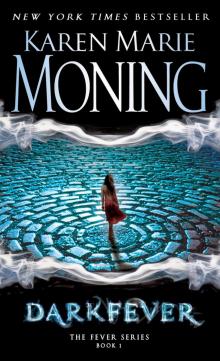 Darkfever
Darkfever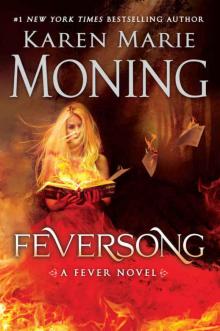 Feversong
Feversong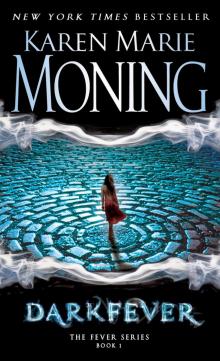 Faefever
Faefever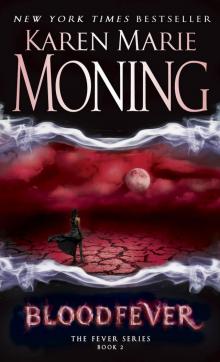 Bloodfever
Bloodfever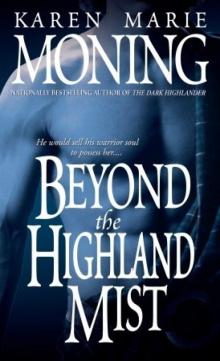 Beyond the Highland Mist
Beyond the Highland Mist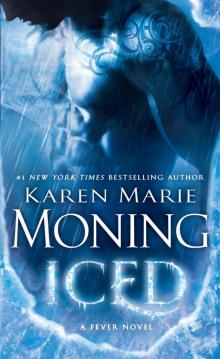 Iced
Iced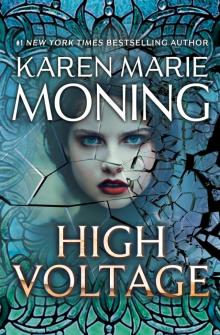 High Voltage
High Voltage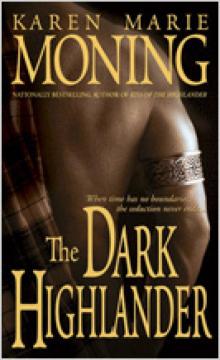 The Dark Highlander
The Dark Highlander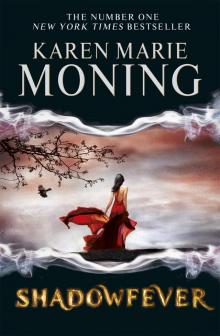 Shadowfever
Shadowfever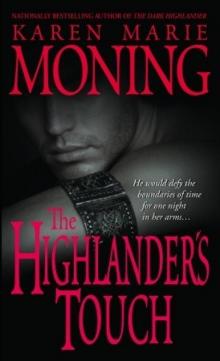 The Highlander's Touch
The Highlander's Touch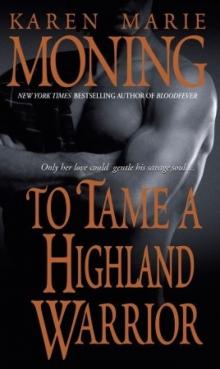 To Tame a Highland Warrior
To Tame a Highland Warrior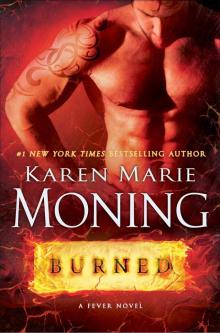 Burned
Burned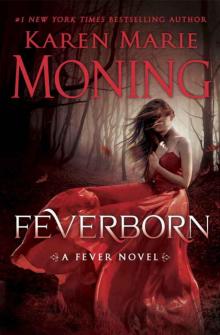 Feverborn
Feverborn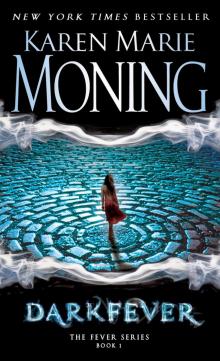 Dreamfever
Dreamfever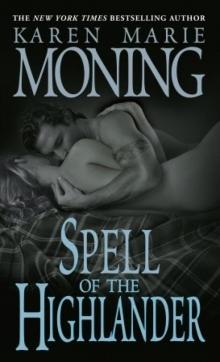 Spell of the Highlander
Spell of the Highlander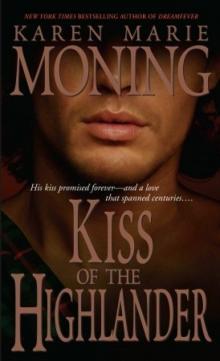 Kiss of the Highlander
Kiss of the Highlander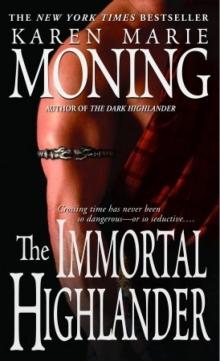 The Immortal Highlander
The Immortal Highlander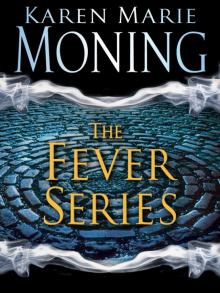 Karen Marie Moning’s Fever Series 5-Book Bundle: Darkfever, Bloodfever, Faefever, Dreamfever, Shadowfever
Karen Marie Moning’s Fever Series 5-Book Bundle: Darkfever, Bloodfever, Faefever, Dreamfever, Shadowfever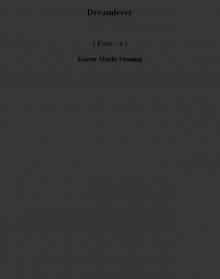 Dreamfever f-4
Dreamfever f-4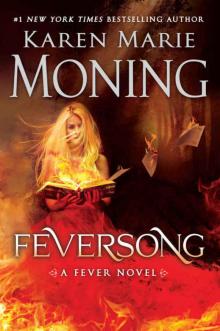 Feversong: A Fever Novel
Feversong: A Fever Novel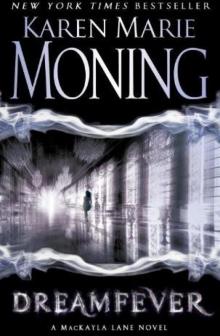 Dreamfever_The Fever Series
Dreamfever_The Fever Series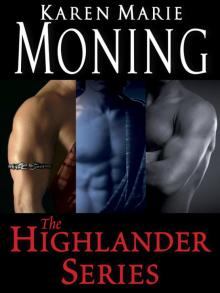 The Highlander Series 7-Book Bundle
The Highlander Series 7-Book Bundle![[Highlander 04] - Kiss of the Highlander Read online](http://i1.bookreadfree.com/i1/03/29/highlander_04_-_kiss_of_the_highlander_preview.jpg) [Highlander 04] - Kiss of the Highlander
[Highlander 04] - Kiss of the Highlander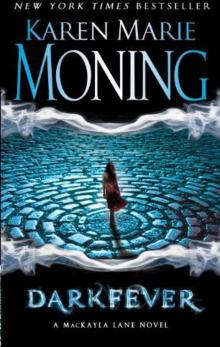 Darkfever_The Fever Series
Darkfever_The Fever Series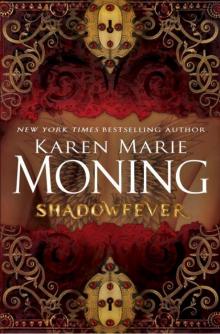 Shadowfever_Fever
Shadowfever_Fever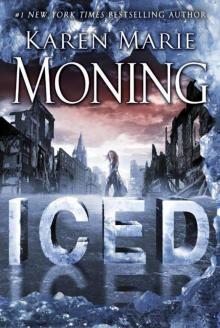 Iced: A Dani O'Malley Novel (Fever Series)
Iced: A Dani O'Malley Novel (Fever Series)![Fever [08] Feverborn Read online](http://i1.bookreadfree.com/i2/04/09/fever_08_feverborn_preview.jpg) Fever [08] Feverborn
Fever [08] Feverborn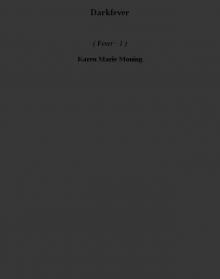 Darkfever f-1
Darkfever f-1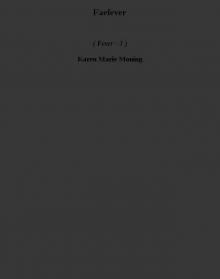 Faefever f-3
Faefever f-3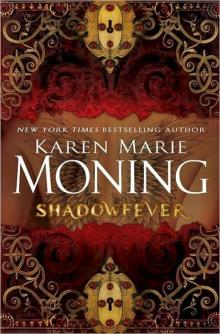 Shadowfever f-5
Shadowfever f-5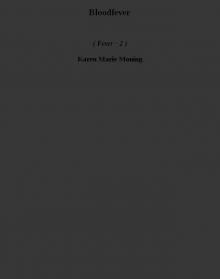 Bloodfever f-2
Bloodfever f-2